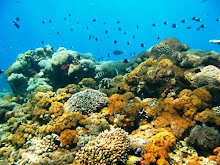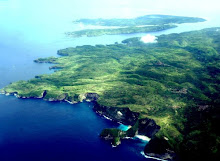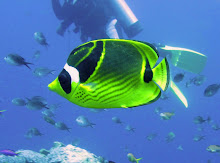oleh Indah Setiawati/JP
“If our diving equipment breaks, we can always buy new equipment in shops. But if the precious coral reef is damaged, where do we buy a new one?”
That remark was not made by a political party targeting voters who support the vulnerable marine treasury protection in Bali in the upcoming general election.
Marthen Welly, a professional diver and project leader of a worldwide organization concerned with natural resources conservation, reiterates that message to everyone he meets when he talks about coral reefs and species living in reefs.
He works for the Nature Conservancy-Coral Triangle Center (TNC-CTC), which is working on a project aimed at conserving the marine area in the Nusa Penida islets, which comprise Nusa Lembongan, Nusa Ceningan and Nusa Penida islands.
Known as a paradise destination for tourists who love scuba diving and snorkeling, the islets feature 1,800 hectares of pristine coral reefs made up of 247 protected coral species. The coral reef beds are home to 562 species of reef fishes.
The islands, however, are ill-equipped with regulations to protect the marine resources, and there is a limited budget to preserve the underwater treasury, as tourists only have to pay entrance fees of as little as Rp 1,000.
Marthen said the TNC-CTC proposed the inclusion of three zones, namely the central, the utilization and the marine tourism zones, in the marine conservation area plan.
The central zone will cover areas that have the most breathtaking underwater view and are often visited by the world-famous Mola-mola fish and other types of marine life, including the manta ray and sperm whale.
The utilization zone comprises offshore areas that can be utilized for seaweed farming and fishing; while the marine tourism zone, which also includes the central zone, can be used for water sports activities.
“Separating the zones is important because the activities in the islets are not well-managed now. People can plant seaweed anywhere, or fish in the snorkeling and diving spots,” Marthen said.
He added if such practices continued, they could trigger a horizontal conflict among seaweed farmers, tourism-related businesspeople and fishermen, as each sought out the best locations for their activities.
“We need to conserve the Nusa Penida islets immediately to prevent damage to the coral reefs, but it can’t been done instantly,” he said, adding the program required local residents, the Klungkung administration and the tourism industry to share the same vision the conservation activists proposed.
He said the idea of a marine conservation area itself could somehow give a wrong impression to local residents because they could mistakenly think they would be prohibited from conducting activities in the conserved area.
Marthen said that once the marine conservation area was approved by the local administration in the form of a regent’s decree, it would be run by a collaborative management body.
“The body will consist of representatives from the local residents, the administration, a local NGO and businesspeople. They will run some programs and determine the dos and don’ts in the conservation area,” he said.
“Currently, there are no rules on the maximum number of people who can dive at the same time. Once I saw 20 boats anchored in the same spot.”
Marthen also said the TNC-CTC would run a study to see how much money overseas tourists were prepared to pay to help conserve the marine area each time they visited the islands.
“I’m sure they would be willing to pay, because most divers understand that the coral reef is priceless,” he said.
He added his organization expected it would take five years to set up the project, and said he hoped that by the end of 2012, the collaborative management body would be able to be an independent and financially sustainable institution.
The project aims to endorse the Coral Triangle Initiative (CTI), a program proposed by several countries to halt the degradation of vulnerable coral colonies and conserve threatened marine species in the coral triangle area, which comprised Indonesia, the Philippines, Malaysia, Timor Leste, Papua New Guinea and the Solomon Islands.
The six countries will sign the initiative at the first ever World Ocean Conference (WOC) in Manado, North Sulawesi, in May this year.
source : http://www.thejakartapost.com/news/2009/02/26/community-moves-protect-reefs.html
Kamis, 26 Februari 2009
Senin, 23 Februari 2009
Residents lack tools to monitor destructive fishing
Indah Setiawati, , The Jakarta Post, , Klungkung Tue, 02/24/2009 12:59 PM Bali
Local fishermen and activists on Nusa Lembongan stated Saturday they do not have the necessary equipment to monitor destructive fishing practices carried out by fishermen from outside the area, placing the tiny island's underwater treasures in constant danger.
Suarbawa, a local resident, said many fishermen from outside the island were regularly seen anchoring their boats some 500 meters off the beach.
He said the residents could not check whether they were using hazardous chemicals or explosive material to fish in the protected reef area because they did not have sufficient boats.
"We have to borrow local fisherman's boats to give chase, but we often lose them as they usually have more powerful boats," said the member of Satya Posana Nusa, a local NGO focusing on environmental conservation.
Lembongan village chief I Nyoman Murta echoed similar sentiments, saying that residents intent on checking the suspicious boats would have to help pay for the fuel of the borrowed boats.
Suarbawa said the lack of necessary equipment had forced them to check suspicious boats when it was already too late, only after local fishermen had reported damage to the coral or a sudden fish scarcity following the presence of the suspect boats.
"It seems there is causality between the two things. When the boats anchor frequently and for a long time, the local fishermen, who use traditional fishing techniques, notice that their catch decreases significantly," he said.
He said the residents had managed to chase the boats, but it was difficult to get hard evidence because the perpetrators simply threw dangerous substances like potassium into the sea.
"Moreover, the explosives they use are getting more sophisticated today; they now make quiet explosions under the sea using a certain tool that can be left underwater," Suarbawa said.
He hoped there would be more serious mechanisms to handle these destructive fishing practices in the future.
Abdul Halim, a program manager for the Nature Conservancy - Coral Triangle Center (TNC-CTC), a global conservation organization working on Nusa Penida, said stricter law enforcement measures were needed to stop these dangerous practices.
"Such fishing methods can inflict severe damage on the protected coral reef and fish and cause negative economic impacts on the locals," he said on the sidelines of the launch of the Community Center in Nusa Lembongan.
The center aims to accomodate various activities related to Nusa Penida marine conservation.
Nusa Penida islets comprise Nusa Penida, Nusa Lembongan and Nusa Ceningan. Located some 11 kilometers southeast of Bali, the islands are home to some 1,800 hectares of 247 protected species of coral reef and 562 species of reef fish.
The area is included in the Coral Triangle Initiative (CTI) program that is aimed at halting the degradation of coral colonies and conserving vulnerable marine species from the impacts of global warming.
Indonesia, the Philippines, Malaysia, Timor Leste, Papua New Guinea and the Solomon Islands will sign the initiative at the first ever World Ocean Conference (WOC) in Manado, North Sulawesi, in May this year.
source : http://www.thejakartapost.com/news/2009/02/24/residents-lack-tools-monitor-destructive-fishing.html
Local fishermen and activists on Nusa Lembongan stated Saturday they do not have the necessary equipment to monitor destructive fishing practices carried out by fishermen from outside the area, placing the tiny island's underwater treasures in constant danger.
Suarbawa, a local resident, said many fishermen from outside the island were regularly seen anchoring their boats some 500 meters off the beach.
He said the residents could not check whether they were using hazardous chemicals or explosive material to fish in the protected reef area because they did not have sufficient boats.
"We have to borrow local fisherman's boats to give chase, but we often lose them as they usually have more powerful boats," said the member of Satya Posana Nusa, a local NGO focusing on environmental conservation.
Lembongan village chief I Nyoman Murta echoed similar sentiments, saying that residents intent on checking the suspicious boats would have to help pay for the fuel of the borrowed boats.
Suarbawa said the lack of necessary equipment had forced them to check suspicious boats when it was already too late, only after local fishermen had reported damage to the coral or a sudden fish scarcity following the presence of the suspect boats.
"It seems there is causality between the two things. When the boats anchor frequently and for a long time, the local fishermen, who use traditional fishing techniques, notice that their catch decreases significantly," he said.
He said the residents had managed to chase the boats, but it was difficult to get hard evidence because the perpetrators simply threw dangerous substances like potassium into the sea.
"Moreover, the explosives they use are getting more sophisticated today; they now make quiet explosions under the sea using a certain tool that can be left underwater," Suarbawa said.
He hoped there would be more serious mechanisms to handle these destructive fishing practices in the future.
Abdul Halim, a program manager for the Nature Conservancy - Coral Triangle Center (TNC-CTC), a global conservation organization working on Nusa Penida, said stricter law enforcement measures were needed to stop these dangerous practices.
"Such fishing methods can inflict severe damage on the protected coral reef and fish and cause negative economic impacts on the locals," he said on the sidelines of the launch of the Community Center in Nusa Lembongan.
The center aims to accomodate various activities related to Nusa Penida marine conservation.
Nusa Penida islets comprise Nusa Penida, Nusa Lembongan and Nusa Ceningan. Located some 11 kilometers southeast of Bali, the islands are home to some 1,800 hectares of 247 protected species of coral reef and 562 species of reef fish.
The area is included in the Coral Triangle Initiative (CTI) program that is aimed at halting the degradation of coral colonies and conserving vulnerable marine species from the impacts of global warming.
Indonesia, the Philippines, Malaysia, Timor Leste, Papua New Guinea and the Solomon Islands will sign the initiative at the first ever World Ocean Conference (WOC) in Manado, North Sulawesi, in May this year.
source : http://www.thejakartapost.com/news/2009/02/24/residents-lack-tools-monitor-destructive-fishing.html
Minggu, 22 Februari 2009
Nusa Penida Community Center
Nusa Penida, 21 Februari 2009 – Masyarakat Nusa Lembongan yang tergabung dalam Satya Posana Nusa, difasilitasi oleh The Nature Conservancy – Coral Triangle Center (TNC-CTC) membuka Community Center (Pusat Kegiatan Masyarakat) di Nusa Lembongan. Berbagai kegiatan yang akan dilakukan masyarakat di Community Center ini diantaranya adalah berbagai pelatihan, pertemuan, diskusi, lokakarya dan konsultasi terkait pelestarian ekosistem pesisir dan laut di kecamatan Nusa Penida.
Direktur Program Segitiga Terumbu Karang TNC-CTC, Rili Djohani, dalam acara peluncuran mengatakan, “Bagi TNC-CTC, pembentukan Community Center ini adalah bagian dari upaya TNC dalam meningkatkan kapasitas lokal agar bisa secara aktif mengambil inisiatif dan peran dalam upaya-upaya perlindungan dan konservasi laut di pulau mereka sendiri.” Lebih lanjut Rili Djohani menjelaskan “pendekatan kolaboratif dan partisipatif inilah yang didorong dalam rangka kemitraan antara TNC-CTC dengan pemerintah Indonesia untuk melindungi terumbu karang dan biota laut penting lainnya di kawasan Segitiga Terumbu Karang (Coral Triangle) yang meliputi Indonesia, Filipina, Malaysia, Timor Leste, Papua Nugini dan Kepulauan Solomon.”
Saat ini, TNC-CTC bekerja di Nusa Penida bersama masyarakat setempat, pemerintah Kabupaten Klungkung dan mitra lainnya untuk memfasilitasi pembentukan dan pengelolaan Kawasan Konservasi Laut (KKL) Nusa Penida yang akan memiliki luas sekitar 10,000 hektar. KKL itu nantinya akan memiliki beberapa wilayah peruntukan (zona) yang diantaranya adalah zona perlindungan untuk kelestarian terumbu karang dan tempat berkembangbiak biota laut penting seperti jenis ikan bernilai ekonomi tinggi, mola mola and pari manta. KKL ini juga akan memiliki zona pemanfaatan, baik untuk budidaya rumput laut, parwisata bahari dan perikanan tangkap.
Project Leader TNC-CTC untuk Nusa Penida, Marthen Welly mengatakan, “tujuan utama dari pembentukan KKL Nusa Penida ini adalah pelestarian keanekaragaman hayati laut untuk keberlangsungan sumber matapencaharian masyarakat. Hasil yang akan didapat adalah keselarasan antara pelestarian keanekaragaman biota laut dan terumbu karang dengan ketahanan pangan dan penghidupan yang bersumber dari laut, untuk jangka waktu yang panjang.”
Tokoh masyarakat Nusa Penida yang tergabung dalam Satya Posana Nusa dan ikut aktif dalam seluruh upaya pelestarian dan perlindungan laut Nusa Penida, I Wayan Suarbawa mengatakan, “Community Center ini akan menjadi pusat berbagai kegiatan masyarakat untuk meningkatkan pengetahuan dan ketrampilan dalam pelestarian keanekaragaman hayati laut di Nusa Penida.” “Kalau bukan kami sendiri warga Nusa Penida yang menjaga kekayaan laut pulau kami, lalu siapa lagi?” demikian Suarbawa menambahkan.
Secara geografis, Nusa Penida adalah kecamatan yang terdiri dari tiga pulau, yaitu Nusa Penida, Nusa Lembongan, dan Nusa Ceningan, terletak di bagian selatan kawasan Coral Triangle. Kecamatan yang berjarak 45 menit perjalanan dari Sanur menggunakan speedboat ini memiliki luas total daratan 20.000 hektar dan sekitar 44 ribu penduduk yang tersebar di 16 desa, dengan sumber penghasilan utama budidaya rumput laut dan pariwisata bahari.
Perairan Nusa Penida memiliki 230 hektar area hutan bakau, 1.800 hektar terumbu karang, dan perairannya terkenal dengan Mola-Mola, Pari Manta (manta birostris), Penyu Hijau (chelonia mydas), Penyu Sisik (Eretmochelys imbricata), Dugong (dugong dugon), Paus Sperma (physeter catodon), dan beberapa jenis lumba-lumba. Berdasarkan kajian ekologi laut secara cepat terbaru di perairan Nusa Penida dijumpai 247 jenis karang dan 562 jenis ikan. Hal ini menunjukan perairan Nusa Penida memiliki keanekaragaman hayati laut yang cukup tinggi sebagai bagian dari kawasan Coral Triangle.
Pemerintah Republik Indonesia mencanangkan program untuk memperluas kawasan konservasi laut (KKL) di Indonesia menjadi 10 juta hektar pada tahun 2010 dan 20 juta hektar pada tahun 2020. Presiden Susilo Bambang Yudhoyono juga telah mencanangkan Coral Triangle Initiative (CTI) pada tahun 2007 saat APEC di Sydney Australia untuk melestarikan terumbu karang di kawasan Coral Triangle, yang mendapatkan dukungan dari enam negara dalam wilayah tersebut bersama Amerika dan Australia. Seluruh upaya pemerintah Indonesia ini merupakan bagian dari upaya konkrit dalam menyongsong rencana aksi bersama yang akan disahkan oleh seluruh negara yang tergabung dalam World Ocean Conference (WOC) di Manado, Sulawesi Utara, pada Mei 2009 nanti.
Marthen Welly / Project Leader – Nusa Penida
The Nature Conservancy-Coral Triangle Center (TNC-CTC)
Mobile: 08123877089, Email: mwelly@tnc.org
Direktur Program Segitiga Terumbu Karang TNC-CTC, Rili Djohani, dalam acara peluncuran mengatakan, “Bagi TNC-CTC, pembentukan Community Center ini adalah bagian dari upaya TNC dalam meningkatkan kapasitas lokal agar bisa secara aktif mengambil inisiatif dan peran dalam upaya-upaya perlindungan dan konservasi laut di pulau mereka sendiri.” Lebih lanjut Rili Djohani menjelaskan “pendekatan kolaboratif dan partisipatif inilah yang didorong dalam rangka kemitraan antara TNC-CTC dengan pemerintah Indonesia untuk melindungi terumbu karang dan biota laut penting lainnya di kawasan Segitiga Terumbu Karang (Coral Triangle) yang meliputi Indonesia, Filipina, Malaysia, Timor Leste, Papua Nugini dan Kepulauan Solomon.”
Saat ini, TNC-CTC bekerja di Nusa Penida bersama masyarakat setempat, pemerintah Kabupaten Klungkung dan mitra lainnya untuk memfasilitasi pembentukan dan pengelolaan Kawasan Konservasi Laut (KKL) Nusa Penida yang akan memiliki luas sekitar 10,000 hektar. KKL itu nantinya akan memiliki beberapa wilayah peruntukan (zona) yang diantaranya adalah zona perlindungan untuk kelestarian terumbu karang dan tempat berkembangbiak biota laut penting seperti jenis ikan bernilai ekonomi tinggi, mola mola and pari manta. KKL ini juga akan memiliki zona pemanfaatan, baik untuk budidaya rumput laut, parwisata bahari dan perikanan tangkap.
Project Leader TNC-CTC untuk Nusa Penida, Marthen Welly mengatakan, “tujuan utama dari pembentukan KKL Nusa Penida ini adalah pelestarian keanekaragaman hayati laut untuk keberlangsungan sumber matapencaharian masyarakat. Hasil yang akan didapat adalah keselarasan antara pelestarian keanekaragaman biota laut dan terumbu karang dengan ketahanan pangan dan penghidupan yang bersumber dari laut, untuk jangka waktu yang panjang.”
Tokoh masyarakat Nusa Penida yang tergabung dalam Satya Posana Nusa dan ikut aktif dalam seluruh upaya pelestarian dan perlindungan laut Nusa Penida, I Wayan Suarbawa mengatakan, “Community Center ini akan menjadi pusat berbagai kegiatan masyarakat untuk meningkatkan pengetahuan dan ketrampilan dalam pelestarian keanekaragaman hayati laut di Nusa Penida.” “Kalau bukan kami sendiri warga Nusa Penida yang menjaga kekayaan laut pulau kami, lalu siapa lagi?” demikian Suarbawa menambahkan.
Secara geografis, Nusa Penida adalah kecamatan yang terdiri dari tiga pulau, yaitu Nusa Penida, Nusa Lembongan, dan Nusa Ceningan, terletak di bagian selatan kawasan Coral Triangle. Kecamatan yang berjarak 45 menit perjalanan dari Sanur menggunakan speedboat ini memiliki luas total daratan 20.000 hektar dan sekitar 44 ribu penduduk yang tersebar di 16 desa, dengan sumber penghasilan utama budidaya rumput laut dan pariwisata bahari.
Perairan Nusa Penida memiliki 230 hektar area hutan bakau, 1.800 hektar terumbu karang, dan perairannya terkenal dengan Mola-Mola, Pari Manta (manta birostris), Penyu Hijau (chelonia mydas), Penyu Sisik (Eretmochelys imbricata), Dugong (dugong dugon), Paus Sperma (physeter catodon), dan beberapa jenis lumba-lumba. Berdasarkan kajian ekologi laut secara cepat terbaru di perairan Nusa Penida dijumpai 247 jenis karang dan 562 jenis ikan. Hal ini menunjukan perairan Nusa Penida memiliki keanekaragaman hayati laut yang cukup tinggi sebagai bagian dari kawasan Coral Triangle.
Pemerintah Republik Indonesia mencanangkan program untuk memperluas kawasan konservasi laut (KKL) di Indonesia menjadi 10 juta hektar pada tahun 2010 dan 20 juta hektar pada tahun 2020. Presiden Susilo Bambang Yudhoyono juga telah mencanangkan Coral Triangle Initiative (CTI) pada tahun 2007 saat APEC di Sydney Australia untuk melestarikan terumbu karang di kawasan Coral Triangle, yang mendapatkan dukungan dari enam negara dalam wilayah tersebut bersama Amerika dan Australia. Seluruh upaya pemerintah Indonesia ini merupakan bagian dari upaya konkrit dalam menyongsong rencana aksi bersama yang akan disahkan oleh seluruh negara yang tergabung dalam World Ocean Conference (WOC) di Manado, Sulawesi Utara, pada Mei 2009 nanti.
Marthen Welly / Project Leader – Nusa Penida
The Nature Conservancy-Coral Triangle Center (TNC-CTC)
Mobile: 08123877089, Email: mwelly@tnc.org
Langganan:
Postingan (Atom)










